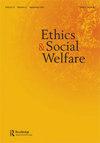超越一个故事:寄宿学校男孩成长的周边历史
IF 0.9
Q4 SOCIAL WORK
引用次数: 0
摘要
近几十年来,一个关于寄宿学校中可怕而普遍的虐待行为的奇异故事被认为是规范的真理。宗教团体开办的学校尤其受到谴责。一个单一的故事可以将经历综合起来,并可以掩盖我们如何理解过去的细微差别和复杂性。不可避免的是,其他故事被淹没在任何宏大的叙述之下。在寄宿学校的情况下,这些被淹没的故事属于那些在寄宿学校长大的孩子,他们没有意识到自己在主导故事中。这篇文章描述了苏格兰一所由天主教会开办的寄宿学校的生活。作者在20世纪80年代一直在那里工作,并对他在那里照顾的男孩进行了生活史采访。他们的叙述有力地反驳了学校的主流说法。本文从叙事探究的角度出发,探讨了这两个故事之间的鸿沟。它告诫人们不要试图从现在的有利位置来判断过去,并呼吁对社会工作历史采取比目前明显的更细致和更有根据的方法。本文章由计算机程序翻译,如有差异,请以英文原文为准。
Beyond a Single Story: Peripheral Histories of Boys Brought Up in a Residential School
ABSTRACT In recent decades, a singular story that speaks of awful and endemic abuse in residential schools has assumed a status as normative truth. Schools run by religious orders attract particular opprobrium. A single story can act to totalise experiences and can occlude nuance and complexity in how we understand the past. Invariably, other stories are to be found submerged beneath any grand narrative that has been laid down. In the case of residential schools, these submerged stories belong to those children brought up in residential schools who do not recognise themselves in the dominant story. This article offers an account of life in a Scottish residential school run by a Catholic religious order. The author worked there over the course of the 1980s and has conducted life-history interviews with boys he looked after there. Their accounts offer a powerful counter narrative to the dominant story of the schools. The article proceeds to discuss the gulf between the two stories from a position of narrative inquiry. It cautions against attempts to judge the past from the vantage point of the present and calls for more finely grained and grounded approaches to social work history than are currently evident.
求助全文
通过发布文献求助,成功后即可免费获取论文全文。
去求助
来源期刊

Ethics and Social Welfare
SOCIAL WORK-
CiteScore
1.60
自引率
20.00%
发文量
36
期刊介绍:
Ethics and Social Welfare publishes articles of a critical and reflective nature concerned with the ethical issues surrounding social welfare practice and policy. It has a particular focus on social work (including practice with individuals, families and small groups), social care, youth and community work and related professions. The aim of the journal is to encourage dialogue and debate across social, intercultural and international boundaries on the serious ethical issues relating to professional interventions into social life. Through this we hope to contribute towards deepening understandings and further ethical practice in the field of social welfare. The journal welcomes material in a variety of formats, including high quality peer-reviewed academic papers, reflections, debates and commentaries on policy and practice, book reviews and review articles. We actively encourage a diverse range of contributions from academic and field practitioners, voluntary workers, service users, carers and people bringing the perspectives of oppressed groups. Contributions might include reports on research studies on the influence of values and ethics in social welfare practice, education and organisational structures, theoretical papers discussing the evolution of social welfare values and ethics, linked to contemporary philosophical, social and ethical thought, accounts of ethical issues, problems and dilemmas in practice, and reflections on the ethics and values of policy and organisational development. The journal aims for the highest standards in its published material. All material submitted to the journal is subject to a process of assessment and evaluation through the Editors and through peer review.
 求助内容:
求助内容: 应助结果提醒方式:
应助结果提醒方式:


